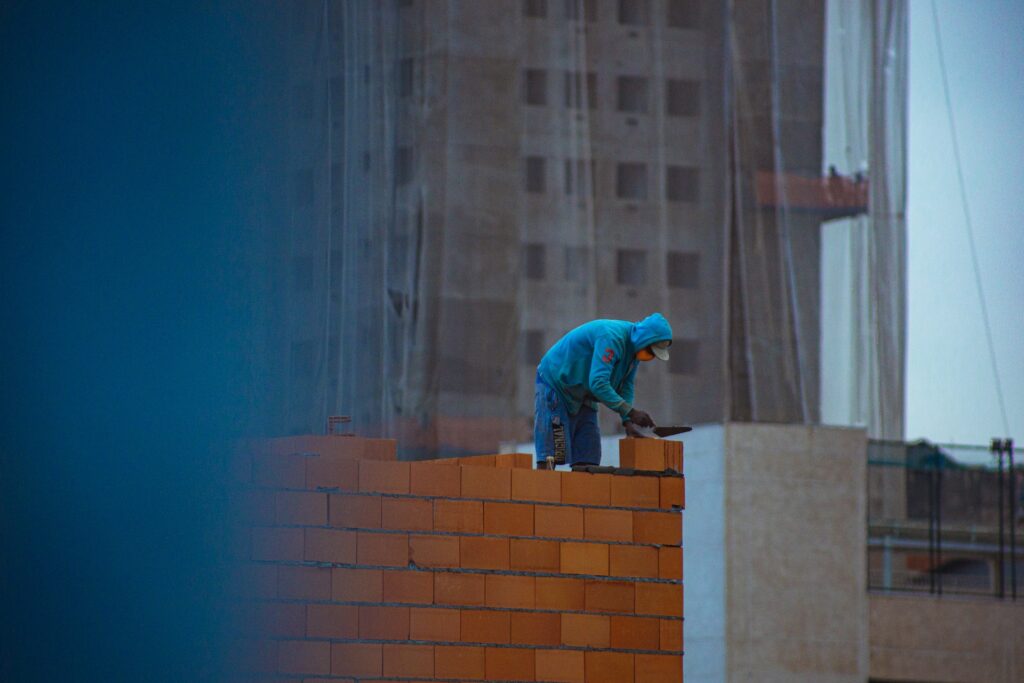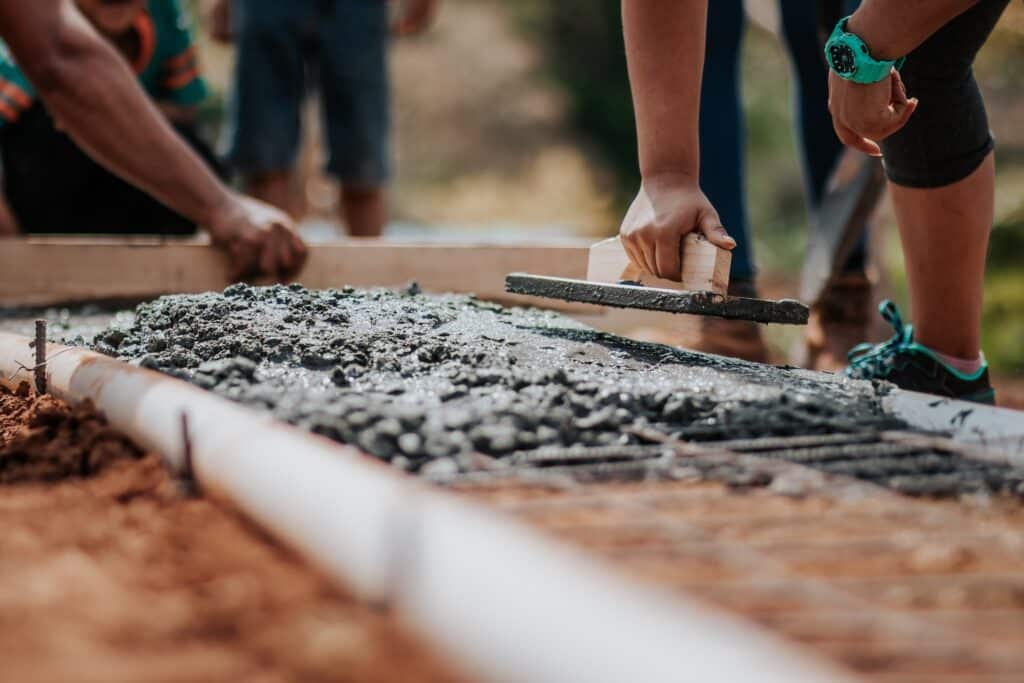A brick layer is a person, specifically skilled in laying bricks to construct a building. Hiring a good brick layer will always ensure the safety and longevity of the house a person resides in.
In this guide, tailored specifically for recruiters, we delve into the multifaceted process of hiring a bricklayer who not only excels in masonry techniques but also seamlessly integrates into your construction team. From crafting compelling job descriptions to evaluating practical skills and assessing soft skills, we leave no stone unturned in identifying candidates who contribute to the success of your projects.
Join us as we explore the art of recruiting bricklayers, from understanding the intricate nuances of their role to harnessing the power of targeted recruitment channels. Let’s delve into the essence of their craftsmanship and discover how to identify candidates who will shape the skyline with excellence and precision.
Understanding the role of a bricklayer
The role of a bricklayer is pivotal in the construction industry, forming the foundation of numerous architectural marvels. Bricklayers are skilled craftsmen responsible for constructing walls, buildings, and various structures using bricks, concrete blocks, and other masonry materials. Their precision and expertise play a crucial role in ensuring the structural integrity, durability, and aesthetic appeal of construction projects.
Beyond the physical aspect of laying bricks, bricklayers also interpret blueprints and construction plans to determine the exact placement and arrangement of materials. They meticulously measure, cut, and shape bricks, applying mortar to secure them in place. Attention to detail is paramount, as even a slight misalignment can lead to structural flaws.
Bricklayers must possess a profound understanding of different masonry techniques, such as Flemish bond, English bond, and stretcher bond, to achieve the desired pattern and load-bearing capacity. They work closely with other construction professionals, collaborating with architects, engineers, and supervisors to ensure seamless integration of their work within the larger project.
In addition to technical skills, bricklayers should exhibit physical stamina, as the role often involves lifting heavy materials and working outdoors in various weather conditions. Their commitment to safety protocols and adherence to industry standards are instrumental in creating secure and resilient structures that stand the test of time.
In the subsequent sections, we will delve deeper into the essential skills, qualifications, and strategies to effectively hire skilled bricklayers who can contribute significantly to your construction projects.
Identifying Key skills and qualifications
Hiring a proficient bricklayer involves recognizing the essential skills and qualifications that define their expertise in the realm of masonry. Firstly, a strong command of masonry techniques, including bricklaying patterns, mortar application, and brick cutting, is imperative. An adept bricklayer should exhibit precision in measurement and alignment, ensuring the structural integrity and aesthetic appeal of the final product.
Physical stamina is a fundamental requirement, as bricklaying demands lifting heavy materials, extended periods of standing, and maneuvering in challenging work environments. Equally important are excellent hand-eye coordination and manual dexterity to handle intricate tasks efficiently.
Communication skills are often underrated but vital for bricklayers, especially when working in teams or liaising with architects and project managers. The ability to comprehend and interpret blueprints and construction plans ensures accurate execution of designs.
Qualifications such as completion of a bricklaying apprenticeship, vocational training, or certification from relevant masonry associations validate a bricklayer’s proficiency. These qualifications serve as indicators of technical knowledge and commitment to the craft.
Furthermore, safety consciousness is paramount. Bricklayers should be well-versed in safety protocols to minimize risks on the construction site. Demonstrated reliability, attention to detail, and adaptability round out the skill set of an exceptional bricklayer.
By identifying these key skills and qualifications, recruiters can more effectively assess candidates and secure skilled bricklayers who contribute positively to construction projects while upholding quality and safety standards.

Crafting a compelling job description
A well-crafted job description is the foundation of attracting qualified bricklayer candidates who align with your company’s needs and values. Begin with a concise overview of the role, highlighting its significance within the construction team. Provide a glimpse into the exciting projects the bricklayer will contribute to, emphasizing the opportunity for skill growth and professional development.
Detail the responsibilities and tasks involved, including bricklaying techniques, mortar mixing, and blueprint interpretation. Mention any specialized skills or techniques required, such as experience with various bond patterns or the use of cutting-edge masonry tools.
When outlining qualifications, balance the technical requirements with the desired soft skills. Mention mandatory certifications, apprenticeships, or relevant education while also stressing the importance of teamwork, communication, and a commitment to safety practices.
Describe the work environment and conditions honestly – this ensures candidates have a realistic expectation of what the role entails. Highlight any unique aspects of your company culture, benefits, or growth opportunities that set your organization apart.
End with a strong call-to-action, inviting interested candidates to apply. Provide clear instructions on how to submit applications and emphasize the deadline. A compelling job description not only attracts skilled bricklayers but also gives them a sense of the role’s importance and the value they’ll bring to your construction projects.
Utilizing targeted recruitment channels
Effectively reaching skilled bricklayer candidates requires a strategic approach to recruitment channels. Begin by exploring specialized job boards and industry-specific websites that cater to construction professionals. Websites like “ConstructionJobs” or “BricklayingCareers” can connect you with candidates who are actively seeking opportunities in the field.
Don’t underestimate the power of social media platforms like LinkedIn, where you can leverage professional networks and industry groups. Posting engaging content about your company’s construction projects and the role you’re hiring for can pique the interest of potential bricklayers.
Participating in construction trade shows, job fairs, and networking events allows you to interact with candidates face-to-face and showcase your company’s commitment to excellence. Building connections in person can leave a lasting impression on potential hires.
Consider partnering with local trade schools, vocational training centers, and masonry associations. They often have resources to connect recruiters with skilled bricklayer candidates who have received formal training and education in the field.
Networking with industry professionals, such as architects, engineers, and subcontractors, can lead to referrals and recommendations. Word-of-mouth remains a potent tool in the construction community.
By strategically utilizing these targeted recruitment channels, you can tap into a pool of qualified bricklayer candidates who are enthusiastic about contributing their skills to your construction projects.
Screening and interviewing techniques
Identifying the right bricklayer for your construction team involves a comprehensive screening and interviewing process. Start by reviewing resumes and applications for relevant qualifications, certifications, and experience in bricklaying. Look for candidates who showcase a strong track record in both technical proficiency and safety adherence.
Craft a set of interview questions that assess technical skills and problem-solving abilities. Pose scenarios that require candidates to demonstrate their approach to challenges commonly encountered in bricklaying projects. Ask about their familiarity with different bond patterns, handling challenging materials, and adapting to changing project requirements.
Incorporate behavioral questions to gauge a candidate’s collaboration skills and adaptability on the job site. Inquire about their experience working in teams, communication with project managers, and adherence to safety protocols.
Practical assessments are invaluable. Invite candidates to perform tasks such as brick alignment, mortar mixing, and even blueprint interpretation. These hands-on exercises provide insight into their craftsmanship and attention to detail.
Furthermore, consider involving current team members or supervisors in the interview process. Their perspectives can provide valuable insights into how well a candidate might fit within your company culture and existing team dynamics.
By combining rigorous screening with thoughtful interview techniques, you’ll be better equipped to select bricklayers who not only possess the necessary technical skills but also align with your construction team’s values and collaborative spirit.
Assessing practical skills and experience
Evaluating the practical skills and hands-on experience of potential bricklayer candidates with a bricklayer assessment is a critical step in ensuring their suitability for your construction projects. Begin by designing practical assessments that mirror real-world scenarios. Provide candidates with bricks, mortar, and tools, and observe their technique in areas like brick alignment, mortar consistency, and efficient use of materials.
Create a controlled environment where candidates can showcase their abilities while under reasonable pressure, similar to the conditions they would face on an actual job site. This helps you gauge their precision, speed, and adaptability.
Include tasks that require candidates to work with different bond patterns, navigate corners and angles, and handle specialty bricks or materials. A diverse set of challenges in the assessment will reveal a candidate’s versatility.
Consider providing a blueprint or construction plan that candidates must interpret and translate into their bricklaying work. This showcases their ability to follow instructions and attention to detail.
When candidates have prior project experience, ask them to provide a portfolio of completed projects, highlighting their role, the challenges they encountered, and how they overcame them. This provides insight into their history of successful bricklaying projects.
By meticulously assessing the practical skills and experience of bricklayer candidates, you can make informed decisions that lead to hiring individuals capable of delivering high-quality workmanship and contributing positively to your construction endeavors.

Evaluating soft skills and fit
While technical expertise is crucial, assessing a bricklayer’s soft skills and cultural fit within your construction team is equally significant. Effective communication is a cornerstone in the construction industry. During interviews, observe how candidates articulate their thoughts, share ideas, and respond to questions. Strong communication skills ensure seamless collaboration with colleagues, architects, and project managers.
Teamwork is another essential soft skill. Inquire about their experiences working in construction teams and their approach to resolving conflicts or differences of opinion on the job site. A cohesive team contributes to a smoother construction process.
Adaptability and problem-solving ability are valuable traits in a bricklayer. Discuss instances when candidates had to adjust to unforeseen challenges, adapt to changing project requirements, or find creative solutions to complex masonry issues.
Consider the candidate’s commitment to safety protocols and their proactive approach to minimizing risks on the job site. A safety-conscious bricklayer contributes to a secure work environment for everyone.
Evaluate cultural fit by discussing your company’s values, work ethic, and collaborative approach. Gauge the candidate’s enthusiasm about contributing to your projects and their alignment with your company’s mission.
By evaluating these soft skills and fit factors, you can ensure that the bricklayer you hire not only possesses the necessary technical skills but also brings a positive attitude, effective communication, and a cooperative spirit to your construction team.
Checking references and background
Verifying a bricklayer candidate’s references and background is a crucial step in the hiring process, offering valuable insights into their work history, reliability, and professionalism. Contacting previous employers, supervisors, or colleagues allows you to gather first-hand accounts of the candidate’s performance, work ethic, and adherence to safety protocols.
When speaking with references, ask about the candidate’s ability to meet deadlines, collaborate with others, and handle challenging projects. Inquire about their problem-solving skills, attention to detail, and overall contribution to the construction team.
Conducting a background check adds an extra layer of due diligence. This step ensures that the candidate’s claims regarding their qualifications, work history, and certifications are accurate and verifiable. It also helps identify any potential red flags that might affect their suitability for the role.
During the background check, ensure that the candidate possesses the necessary licenses or certifications required for bricklaying. This step helps maintain compliance with industry regulations and reinforces the candidate’s commitment to their profession.
By diligently checking references and conducting background checks, you can make informed decisions about hiring bricklayers who not only possess the technical skills but also have a proven track record of reliability, professionalism, and a commitment to safety and quality.
Conclusion
In the world of construction, hiring a skilled bricklayer is akin to selecting the cornerstone upon which your projects will stand. The journey we’ve undertaken in this guide equips recruiters with the knowledge and strategies needed to navigate the process effectively. From understanding the multifaceted role of a bricklayer to evaluating their practical skills and cultural fit, the insights shared here empower recruiters to make informed choices that resonate throughout the construction process.
As we conclude this guide, we invite you to embark on the journey of selecting bricklayers who align with your company’s values, elevate your construction projects, and contribute to a legacy of quality craftsmanship. By combining technical prowess with collaborative spirit, the bricklayers you hire will not only build structures but also forge relationships and create lasting impressions in the world of construction.
Testlify offers a range of assessments and challenges that allow you to gauge candidates’ knowledge, problem-solving skills, and creativity in real-world scenarios. With Testlify, you can administer real-world challenges that simulate the actual assessment process, giving candidates the opportunity to showcase their skills and approach. The platform provides a structured and standardized assessment process, allowing you to compare candidates objectively and make informed decisions. By incorporating Testlify into your hiring process, you can ensure a more comprehensive and reliable evaluation of candidates, ultimately helping you identify the most qualified individuals for your team.
With our extensive test library, you can objectively evaluate candidates’ abilities, ensuring you shortlist the most talented individuals efficiently. Ready to unlock the potential of your hiring process? Book a free 30-minute live demo with Testlify. Our expert team will guide you through the platform, showcasing relevant skill tests tailored to your organization’s needs. With our support, you can streamline candidate selection, saving valuable time and resources.








